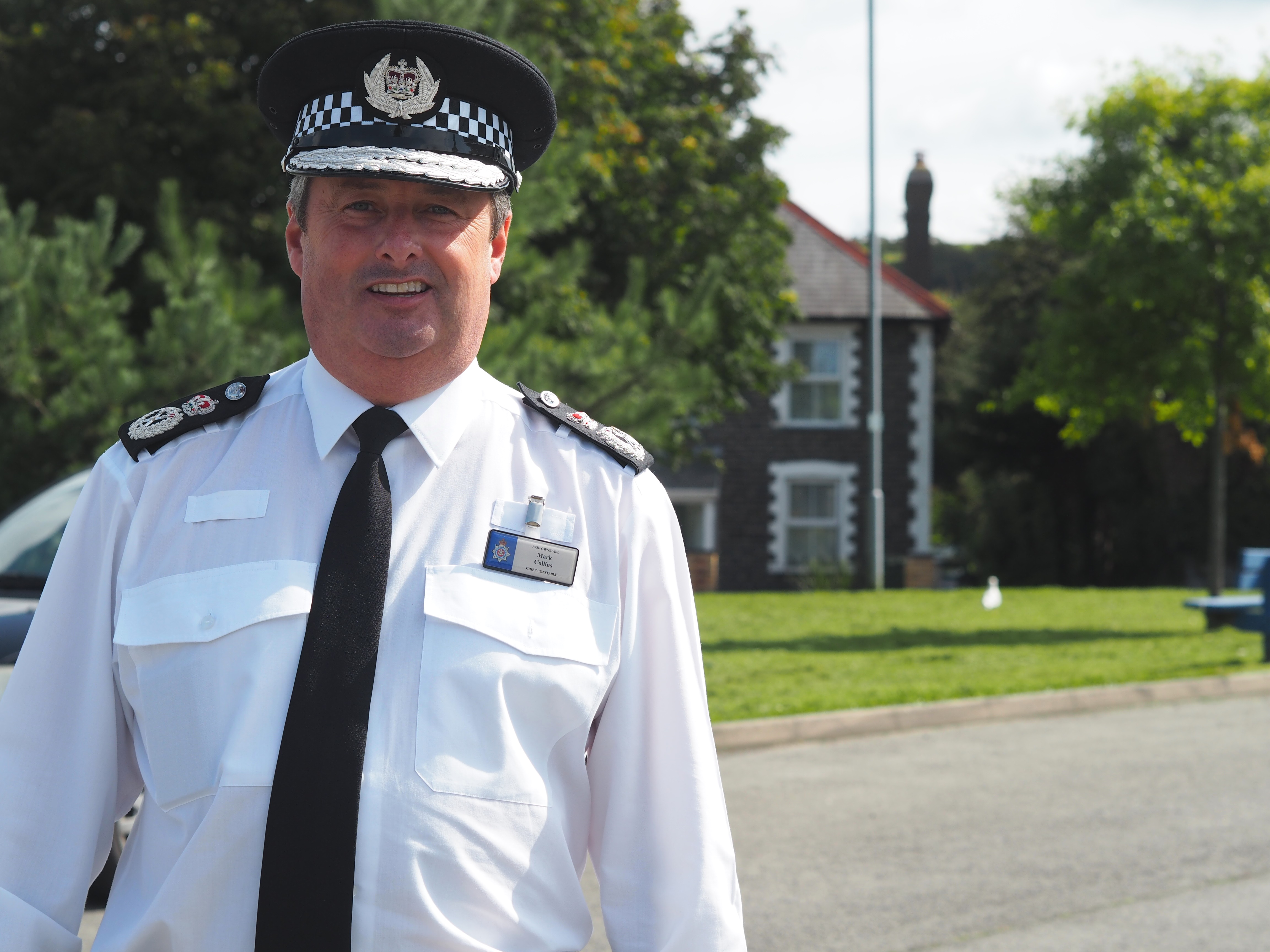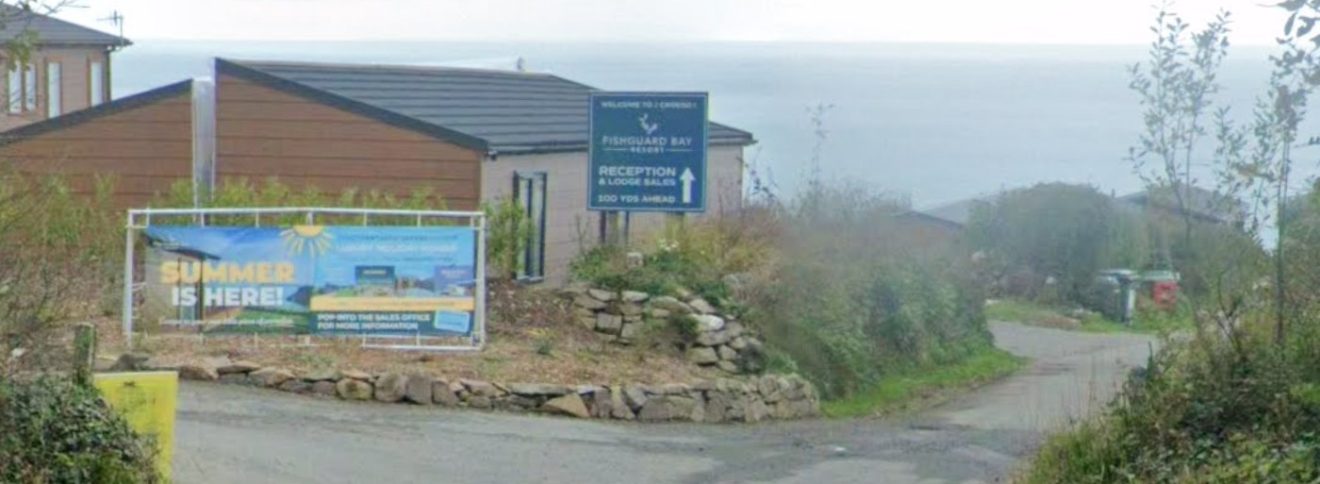News
Chief Constable looks back over four years as a volunteer officer

WHEN Mark Collins put on his volunteer police uniform for the first time in 1987, he could never have guessed that 29 years later he would be walking through the doors of Dyfed-Powys Police headquarters as the chief constable.
Mr Collins has worked his way up the ranks from a PC to the chief constable, but his policing career actually began as an unpaid officer volunteering his time to the force he now leads.
As the force celebrates National Volunteers Week, Mr Collins looks back over the four years he spent in the Special Constabulary and reveals what the police service gains from its team of volunteer officers.
Inspired in part by conversations with local officers in the Carmarthenshire village he grew up in, and partly from watching dramatic incidents unfold on TV series The Bill, Mr Collins was keen to join the police service as a teenager.
He decided firstly to enrol as a Special Constable so he could gain an insight into the role of a PC, and to find out if it was the right career for him.
“I thought I wanted to be a police officer, but not being from a policing background I wanted to find out what it was really like first,” he said.
“It was great to get in and see how the police worked – the roles and responsibilities of an officer, and the variety of things they dealt with. Having joined as a Special, it made me more hungry to join as a regular officer.”
After completing his initial training, Mr Collins went out on his first patrol shift as a Special Constable, supported by a regular officer.
“I spent my first shift travelling around north Carmarthen with Rhian Thomas, a rural officer, going to a number of calls,” he said.
“One memory that stands out is when we visited an elderly lady just outside Carmarthen. We dealt with some problems she had, and it turned out that she was a lady in her own right. We must have made an impact because she then invited us to a garden party.
“Knowing that you have helped someone is hugely rewarding, and as a Special it meant a lot to receive that invitation.”
A milestone for all officers is making their first arrest, and Mr Collins remembers his clearly. He was called to a report of a theft from a supermarket in Carmarthen, and arrested the culprit on the spot.
But he admits he was feeling a mixture of emotions as he put his training into practice.
“I was excited, but also nervous and anxious,” he said. “Was I going to get it right? Was I going to present the evidence to the custody sergeant correctly? It was a big deal, and something I definitely didn’t want to get wrong.”
Considering the perception of Specials, Mr Collins said a lot had changed over the years, with people’s attitudes towards volunteer officers becoming more positive, and more opportunities being opened up to volunteer officers.
Specials at Dyfed-Powys Police have worked on a mental health triage team, established the Specials on horseback scheme, and piloted a joint response unit with the Wales Ambulance Service over the Christmas period when demand increases on both services.
“If I’m honest, the training for Specials in the 80s wasn’t that good, and the support wasn’t that good,” Mr Collins said. “Regulars used to call them hobby bobbies back in the day, and they would only attend fetes and carnivals. You would occasionally get to walk the beat, but you didn’t have all the kit and equipment that we have now.
“We have moved on so much. We have a rank structure within the Special Constabulary, Specials are on the frontline with the same powers as fully warranted officers; they are better equipped; they carry out stop searches and warrants; and play an important part in policing operations.
“We recognise the specialist skills people can bring in from other jobs and the qualities they can bring to the force without needing to join as regular officers.”
Specials must be aged over 18, and must commit to a minimum of 16 hours each month to the force. While Mr Collins accepts that for many it is a way in to the police service, he would like to see more people apply with the aim of becoming ‘career Specials’ – those who are happy to continue as volunteers alongside their day-to-day roles.
“I would like people to see it as a way of supporting their communities, rather than as part of an aspiration to join the police service,” he said.
“It is a chance to do something different. There is so much reality TV, things like 24 Hours in Police Custody and Police Interceptors, and people are drawn in by the cut and thrust of policing – the fast response, blue lights flashing side of things.
“But policing isn’t all about that – there are the 2am patrols, traumatic incidents like attending sudden deaths or collisions, breaking the news that loved ones have passed away. Specials get the chance to dip into all that without giving up their day jobs.”
“For me, volunteering as a Special was the start of my policing career.
“Putting on your uniform for the first time is quite something, and it was a proud moment for both me and my family. And while I joined with aspirations of becoming a regular officer and a detective, never did I think when I walked through the doors of headquarters for the first time that I would walk back in 29 years later as the chief constable.”
Business
Scheme to upgrade Dinas Cross holiday park withdrawn

PLANS to create a ‘five-star resort’ in one of Wales’s most popular holiday locations have been withdrawn.
In an application submitted to Pembrokeshire Coast National Park, Chester-based Boutique Resorts Ltd sought permission to relinquish 50 mixed touring pitches (caravans and tents) at Fishguard Bay Resort, Dinas Cross, replacing them with “36 high quality timber-effect holiday lodges”.
The application, recommended for refusal at the April 24 meeting of the national park’s development management committee, also included an increase in the site area of the approved park, a new entrance, a new reception lodge, staff and visitor parking area, with extensive environmental improvements.
The site, established in the 1950s, currently has planning permission for 50 static caravans and 50 mixed touring units, and it is intended 23 of the proposed lodges to be sited at the entrance, with a further 13 throughout the site.
Despite the proposals seeking a reduction in outright numbers, the applicants say the scheme would see an increase in the number of full and part-time jobs associated with the resort, from 29 to 62 jobs.
A previous application was refused in 2019, mainly on visual impact, ecological impact and highway impact, and the applicant has sought to address the issues raised by that refusal, a supporting statement says.
It adds: “The applicant purchased the site in 2014 with the intention to upgrade the site into a five-star luxury resort. This is very much still the applicant’s intention and whilst he has replaced some existing static caravans with luxury lodges, he also seeks to replace the touring caravans and tents with luxury lodges too.
“The resort is now considered one of the most desirable holiday parks on the Pembrokeshire Coast which is evident on the number of holidaymakers who return to the resort year on year. Such is demand for luxury lodges on the site, the applicant requires additional units.
“The applicant now wishes to move the resort further by replacing the mixed touring pitches with luxury lodges but also provide a much-needed new entrance into the resort.”
Objections to the scheme were received from the National Trust, the national park’s strategic policy and ecologist, and the South Wales Trunk Road Agency, and 12 members of the public, along with one letter of support.
The application was recommended for refusal for reasons including it was “likely to have a significant detrimental impact on the special qualities of the National Park by intensifying the visual impact and intrusion of a large static caravan site within the extensive coastal views of this section of the National Park,” it would represent an intensification of the site, and was likely to “have an unacceptable impact on neighbouring residential amenity through increased noise and traffic movements”.
The application, listed for consideration by park planners next week, has since been withdrawn.
News
First step towards council tax and business rate reform

MAJOR reforms to council tax and business rates have cleared the first hurdle in the Senedd.
MSs backed the general principles of the local government finance bill, which would introduce a five-year cycle for council tax revaluations from 2030.
The bill would lay much of the groundwork for Welsh Government proposals to redesign council tax, with current bands based on property values from 2003.
It would also increase the frequency of business rates revaluations from five to three years.
Rebecca Evans told the Senedd the bill forms a vital part of the Welsh Government’s wider programme of local tax reform.
Wales’ finance minister explained the bill would enable ministers to modify business rate relief exemptions and the multiplier to support policy priorities.
John Griffiths outlined the local government committee’s stage-one report recommendations aimed at improving the bill and guarding against unintended consequences for taxpayers.
Mr Griffiths explained that the bill provides a framework for future policy changes to be made by the Welsh Government via secondary legislation.
The Labour MS, who represents Newport East, said the committee heard concerns that this limits opportunity for public engagement and scrutiny by the Senedd.
Welcoming the Welsh Government’s commitment to retaining the single-person council tax discount at 25%, he highlighted wide-ranging powers in the bill over vital reduction schemes.
In terms of business rates, the committee chair said MSs heard broad support for a move to three-yearly revaluations, which he described as a reasonable, proportionate cycle.
Peredur Owen Griffiths, who chairs the finance committee, backed the bill’s key aim to create a fairer, more flexible system.
The South Wales East MS welcomed reassurances from the Welsh Government that the intention of council tax reforms is not to raise more revenue.
“Given the regressive nature of council tax, we support the aim to make it fairer without affecting the tax base,” he said.
Plaid Cymru’s finance secretary said the proposed powers will reduce the Welsh Government’s reliance on UK bills to make changes.
Alun Davies, a Labour backbencher, warned that delegated powers in the bill risk diminishing the role of the Senedd.
Sam Rowlands, the Tories’ shadow local government secretary, raised concerns about the bill putting more power in the hands of the Welsh Government rather than councils.
He warned the bill is a stepping stone towards higher taxes through the back door, saying: “This bill in and of itself does not necessarily do that but it certainly enables future changes.”
The former leader of Conwy council, who represents North Wales in the Senedd, called for reforms to the formula used to allocate funding to Wales’ 22 councils.
Raising concerns about digital exclusion, Mr Rowlands opposed a provision in the bill which would remove a duty to publish council tax notices in local newspapers.
He said: “We believe it’s a really important part of the democratic process in local government, especially in relation to transparency.”
Backing a revaluation of all 1.5 million properties in Wales, Labour MS Mike Hedges described council tax as fundamentally unfair.
He said: “Someone living in a property worth £100,000 pays around five times as much council tax relative to the property value as someone living in a property worth £1m.”
Mr Hedges, who represents Swansea East, also opposed the removal of the duty to provide council tax information in newspapers.
On business rates, he said: “I’ve always supported the returning of them to local authorities. We don’t need an all-Wales system; let each local authority set its own business rates.”
Ms Evans told the chamber she intends to make a statement on the next steps for council tax reform before the summer recess.
The Senedd agreed the general principles of the reforms without objection, and the bill now moves to stage two which will see MSs consider detailed amendments.
News
Senedd backing for major infrastructure approval changes

THE SENEDD agreed reforms aimed at streamlining the consenting process for significant infrastructure projects in Wales.
MSs passed the infrastructure bill, which will establish a unified process, known as infrastructure consent, for major on and offshore projects.
Infrastructure consent will replace existing procedures for energy, transport, waste, water and gas projects above a certain size or capacity threshold.
Julie James, Wales’ housing, local government and planning secretary, argued the bill will introduce a modern and simplified process.
She said the bill will play an important part in moving towards net-zero emissions by 2050 by enabling consent for renewable energy projects in a timely but robust manner.
She told MSs: “Not only will it improve the competitiveness of Wales as an attractive place for investment and jobs, it will also empower local communities and other key stakeholders.”
Ms James said it is a “process bill” with much of the detail to follow in secondary legislation and a significant amount of work ahead to ensure a smooth implementation process.
She told the chamber that secondary legislation will ensure the infrastructure consenting process operates effectively, efficiently and with maximum engagement.
She explained that two consultation papers will be issued by late May, with the first focused on pre-application consultation processes and the second centred on fees.
A third and final consultation paper will follow this year outlining the whole new process.
Janet Finch-Saunders, the Conservatives’ shadow secretary, described the reforms as hollow and lacking in fundamental details.
She argued this is in complete conflict with the bill’s core aims of delivering a streamlined process and empowering communities to engage.
Ms Finch-Saunders warned that the bill is missing a vast amount of details, including on how open-floor hearings will be triggered and time limits for making decisions.
She said: “It is apparent to any reasonable person that this bill does not represent anywhere near what it promises to do, and that is a streamlined and unified process.
“The reality is that so much information is omitted that we do not know how these processes are going to work in reality.”
The Aberconwy MS added: “Clearly, the legislation is not as I believe it should be. We do not believe that it delivers a robust process for Wales.”
Delyth Jewell stressed the importance of striking the right balance between tackling the climate emergency and safeguarding the natural world.
Plaid Cymru’s deputy leader said planning processes must be more accessible to the public.
“Too often communities are left feeling disenfranchised and marginalised when decisions about infrastructure are made without their say,” she warned.
Calling for a coal-free future for Wales, Ms Jewell reiterated her party’s calls for coal to be removed from the list of significant infrastructure projects in the bill.
The South Wales East MS said: “We will keep pushing for a number of changes in regulations. But passing the buck and allowing this bill to fail would be a retrograde step.
“Let this be the first step in a journey towards democratising our planning process. There’s an awful lot more that we need to do, but it can at least start here.”
Ms James reiterated that many details were deliberately not included “on the face of the bill”.
She said: “If you were to put that into primary legislation, it would become out of date so fast that it wouldn’t make the end of the year.
“So, it is very important that we put those things in secondary legislation.”
Before the debate could be held, the King’s consent had to be sought because the bill could impact the Royal Family’s interests, such as the Crown Estate.
MSs agreed the stage-four vote on the final text of the bill, with 36 in favour and 15 against.
The infrastructure bill now enters “post stage four”, a four-week period during which it could be challenged by the UK Government but it is expected to move on to Royal Assent.
-

 Business2 days ago
Business2 days agoBluestone National Park Resort payments expected to end
-

 Community4 days ago
Community4 days agoThe Harbourmaster: Special rail excursion draws crowds to Milford Haven
-

 News3 days ago
News3 days agoDragon LNG ‘monitoring’ scrap car blaze in Waterston
-

 News4 days ago
News4 days agoSearch for Luke, 19, reported missing in the Pembroke Dock area, continuing
-

 News21 hours ago
News21 hours agoSearch for missing teenager Luke continues at Pembroke Dock
-

 News5 days ago
News5 days agoMajor search in the area of The Cleddau Bridge and Hobbs Point
-

 Crime2 days ago
Crime2 days agoEstate agents admit health and safety failings following fatal market incident
-

 News1 day ago
News1 day agoMan jailed after scarring police officer in Narberth altercation























